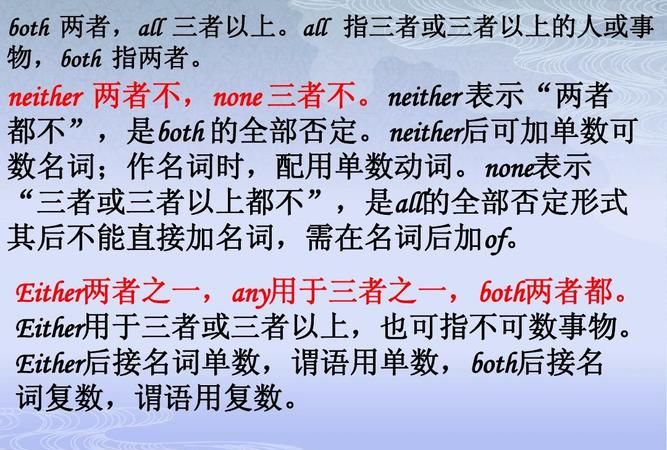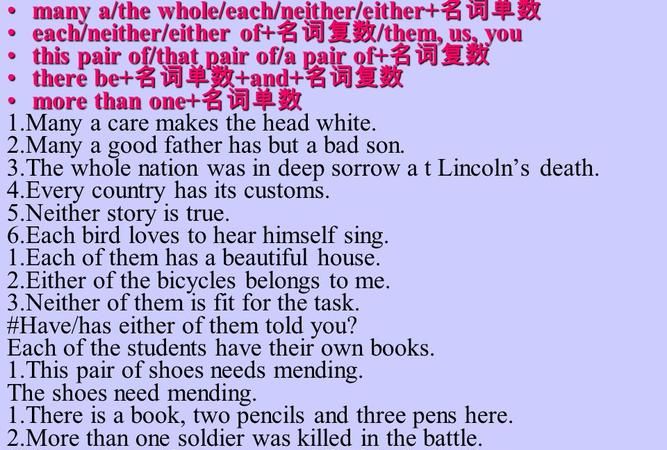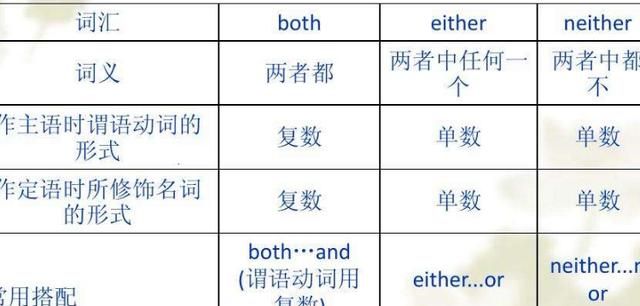本文目录
问both/all/neither/none/either/each of的用法
either: 两者中的任一个
----Shall I come on Tuesday or Wednesday?
---- Either day is OK.
也(用于否定句末,代替肯定句中的too, as well, also)。
He is not a worker, I am not either.
either...or...要么……要么……,或者……或者……
Either you or I am right. 连接主语动词用“就近原则”。
neither 两者都不
Neither of them knows me.他俩谁也不认识我。
neither...nor...既不……也不……
He has neither money nor time. 它既没有钱,也没有时间。
all 全、都(三者以上),既可修饰可数名词也可修饰不可数名词。
All the books are useful to us.
All knowledge comes from practice.
all与否定词not连用为“部分否定”,表示“不是所有的……都……”
I don't know all of them. 他们当中我并不都认识。
All don't agree with you. = Not all agree with you. 并非所有人都同意你。
both 两者都
You can take both of them.两个你都可以拿去。
与否定词连用表示“部分否定”。
I don't know both of them.他俩我并非都认识。
both...and...双方都……
He can both sing and dance.他能歌善舞。
none一个也没有(三者以上全部否定)
None of them has a bike. 他们谁也没有自行车。
none作主语谓语动词单复数均可。
代替上文中出现过的名词,表示“什么也没有”,此时不能用nothing。
----How many apples are there in the fridge?
----None.
each各自,每一(用于两者或两者以上)
Each of us has a new pen.= We each have a new pen.
与not连用表示“部分否定”。
Each of them doesn't swim.他们并非都游泳。
every每个(用于三者或三者以上)不能与of 连用,只能说each of 或every one of
every(包括由every构成的everyone, everything 等不定代词)与not 连用表示“部分否定”。“并非每个都……”
Every student is not able to swim.不是每个学生都会游泳。
Not everybody went there.未必人人去那里。
总结:
1. 涉及两者之间关系的词有either, neither, both, each;涉及三者或三者以上的词有:none, all, every。(除了这几个词之外,还有几个词也涉及“二”、“三”,如between(两者之间)、among(三者以上之间),the other(两者中的另一个)
2. 能与of 连用的是either, neither, both, all, none, each;不能与of 连用的是every,但every one可与of连用。
3. both, every, each, both, all与not 连用均表示“部分否定”,无论not的位置在前还是在后。全部否定的词只有none, neither, none表示三者以上全部否定,neither表示两者之间全部否定。
4. 两者之间的“有无关系”有三种:
neither A nor B A和B两者都不
both A and B A和B两者都
either A or B 要么A要么B

either of 后面加the吗
不是,either说只某物都其中一边,所以是单数。
而某物通常也是单数 例句的意思是“街道的每一侧”。
如果做主语,看成三单。
比如,On either side on the boat sits a boy. 船的两侧,各坐着一个男孩。

either of后面名词用单数还是复数
是2因为either of 表明两者其中的一个,所以其后名词一定是二!但谓语(动词)一定用单数.因为他说的是其中之一!

either的用法总结
1、either作主语时谓语动词一般用单数形式,但在否定句中常用复数形式。可单独用,也可和of连用,of后跟复数名词或复数代词,但意义明确时可省略of短语。
2、either在口语中有时也可放在否定句中的名词后加强语气。
3、either用作副词时须放在否定的动词或形容词之后,表示“也(不)”,加强语气。
例:It's not as heavy, either.
这也不那么重。
4、 用于否定句中,表示“两者都不”。
例:There had been no indication of either breathlessness or any loss of mental faculties right until his death.
直到去世,他既没有出现呼吸困难也没有脑功能丧失的迹象。
5、用于表示“两者中任一…”
例:A special Indian drug police that would have the authority to pursue suspects into either country.
有权到这两国中任意一国追捕嫌犯的一位印度缉毒特警。

扩展资料
同义词
1、or
英 [ɔː] 美 [ɔr]
conj. 或,或者;还是;要不然
n. (Or)人名;(土、匈、土库、阿塞、瑞典)奥尔
例:Everyone benefited from limiting their intake of coffee to just one or two cups a day.
每个人都从每天限量喝一杯或两杯咖啡的做法中受益了。
例:When I was nine or ten someone explained to me that when you are grown up you have to work.
在我9岁或10岁的时候,有人跟我解释说,人长大之后必须工作。
2、vel
英 [vel]
conj. 或者(等于or)
abbr. 上等皮纸(vellum);速率(velocity)
例:In Canada, students at that le vel are youth in their preteen years as well as teenagers.
在加拿大,这个阶段的学生和十几岁的青少年都是青春期前的孩子。
以上就是关于either of后跟单数还是复数 ,Either of **和 neither of **是单数还是复数的全部内容,以及either of后跟单数还是复数 的相关内容,希望能够帮到您。

